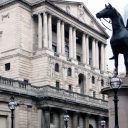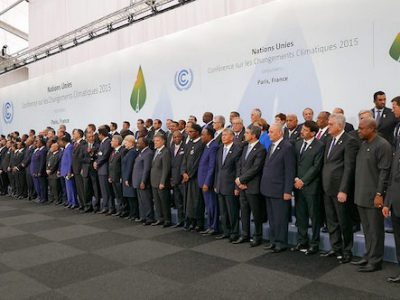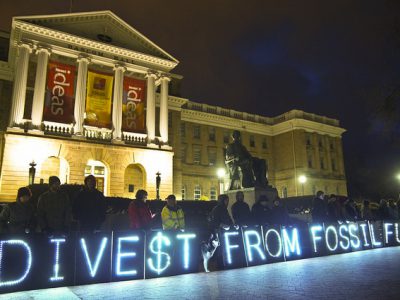Sustainable finance: Funding a low carbon economy

Image: Olearys, CC BY 2.0
Greenhouse gas emissions are deeply woven into our economy. We burn fossil fuels to produce energy, we use nitrous oxide to fertilize our fields, our trash generates methane – all of which contribute to climate change. Reducing this dependency will involve shifting a vast array of practices, throughout our economic and personal lives. And yet climate campaigners and lawmakers alike are paying alarmingly little attention to the financial system that makes these unsustainable practices not only possible but profitable.
Addressing climate change is, at its core, an issue of finance: whether one is fighting against entrenched economic interests tied to the status-quo, or pushing for the development and implementation of new technologies, much of the fight against climate change revolves around money. For example, in order to prevent catastrophic climate change the energy sector would have to invest nearly $17 trillion (US) in energy efficiency and low-carbon technologies from 2015 to 2030. Yet much of the world may be unable to access the finance required.
In order to meet these targets, public spending will have to play a critical role. And indeed, some governments are beginning to step up to this challenge. A great example is the German program on renewable energy, which played a key role in making solar and wind competitive. Governments are also working to provide finance through development banks and funds such as the Green Climate Fund. Meanwhile, projects such as the Global Innovation Lab for Climate Finance aim to create an enabling environment for private sector investment.
Yet while these developments may be encouraging, estimates suggest that public sector finance will fall woefully short of the finance flows required to address climate change. Given the glacial speed of public regulatory action and provision of finance, it is imperative that the financial and corporate sectors contribute to the shift towards sustainable development. The potential is enormous: the banking sector manages financial assets of almost $140 trillion; institutional investors, such as pension funds, manage over $100 trillion; and capital markets, including bonds and equities, exceed $170 trillion.
Important shifts have taken place in the financial and corporate sectors – even as the scale remains far too limited. Investors and managers, for example, are beginning to understand the importance of sustainability as a means of ensuring long-term profitability. Private commercial finance for sustainable businesses increased from $22 billion in 2012 to an annual average of $37 billion over 2013 and 2014, reflecting investors’ growing comfort with renewable energy technologies. Green bonds, which are bonds issued for projects with a positive environmental impact, are another good example. In 2016, nearly $100 billion in green bonds were issued, nearly surpassing the total for all previous years combined. 2017 looks set to beat this record. Greenwash remains a problem, as projects strive to claim ‘green’ status for themselves; yet as the market grows, labelling standards have begun to become stricter and more harmonized, helping concentrate attention on those projects with genuine impact.
More broadly, the pressures of a warming world change the risks we all face. Within the financial world, investors are increasingly looking towards innovative forms of finance that recognise the inherent risk posed to everyone by short-termist approaches to business. These new approaches to investment strive to account for global risks such as climate change in how they select and price shares. This is a slow process, but one gaining momentum.
Yet an increase in private-sector momentum is only possible within a broader policy environment defined by strong, long-term public policies that guide investment and provide credibility to climate action. An example here is the EU long-term mitigation goal of “cutting its GHG emissions, by 2050, by 80-95% compared to 1990 levels.”. The commitments made within the Paris Agreement also go in this direction. Yet there’s still further to go.
For one, there is increasing consensus that a strong carbon price is essential. By making polluters pay for the damage they cause, carbon prices can direct investments towards low-carbon technologies and provide for economic efficiency in climate action. They also provide for a level playing field for corporations, allowing them to compete fairly and encouraging broad buy-in. National and sub-national carbon pricing instruments currently cover 15% of global GHG emissions and their use is on the rise. China, for example, is on track to launch the world’s largest emissions trading scheme.
Beyond this, however, we need to address the failures of our current system, including dismantling the over $500 billion in subsidies given to the fossil fuel industry every year, and regulating the financial sector to re-align it with the needs of the societies it is supposed to serve. This includes increasing regulation that ensures prudential investments, more transparency and disclosure, and more liability, among many others. This would help close the climate finance gap; prevent abuses such as those that led to the 2008/2009 global financial crisis; and make the financial system resilient to the threats that climate change is shaping on the horizon.
Given the need for strong policies to guide both the public and private sector, none of this can happen if we, as citizens, simply stand by and let events take their course. Fighting for smarter climate policy can seem an uphill battle – not least since US has recently installed a ‘denier in chief’. Yet even in the US, 68% of the public now supports the view that humans are the primary cause of climate change, and only 9% believe climate change ‘will never happen’. In other words, the potential for popular pressure remains strong. And, encouragingly, there’s plenty we can do as citizens to bring the urgencies of climate and the financial system in line.
For starters we can each put our money where our mouths are and be willing to pay for the real cost of things: this means paying more for electricity, transport, and sustainable produce. As Dr Kim Nicholas explains, citizens are far from powerless in the face of climate change, and can often have significant impact through their choices as consumers. This should be coupled with strong demands to our government representatives to commit to ambitious climate action, put a high price on carbon, and shape regulation to favour prudential investments. Voters will need to push for this at the ballot box, but also make sure they keep the conversation going, holding politicians to account.
Regulators and investors alike must push companies to ensure that they take interest in sustainable business models and practices. Companies do not develop business strategies in a vacuum, but are shaped by their perception of the options available to them, as well as their perception of what shareholders want. And as David Pitt Watson argued earlier in this series, anyone with a pension is an investor. Financial decisions are taken daily in the name of shareholder interests, yet beyond the super-wealthy, very few shareholders bother to voice their interests at all. As Pitt-Watson notes, shareholder engagement is so rare that even just a few letters from ‘ordinary’ shareholders can change fund managers’ perception of their clients’ interests. Climate change, then, calls for us to be both more invested citizens and citizen investors.
The window of opportunity to halt the catastrophic threats of climate change is very small. We are fast exhausting our planet’s carbon budget, and we risk locking-in carbon-intensive investments that will shape our planet years into the future. In this context, it is imperative not only to be aware of our own power as citizens, but also its scope. The world of finance has long been out of focus for climate change campaigners. Now is the time to change that.









